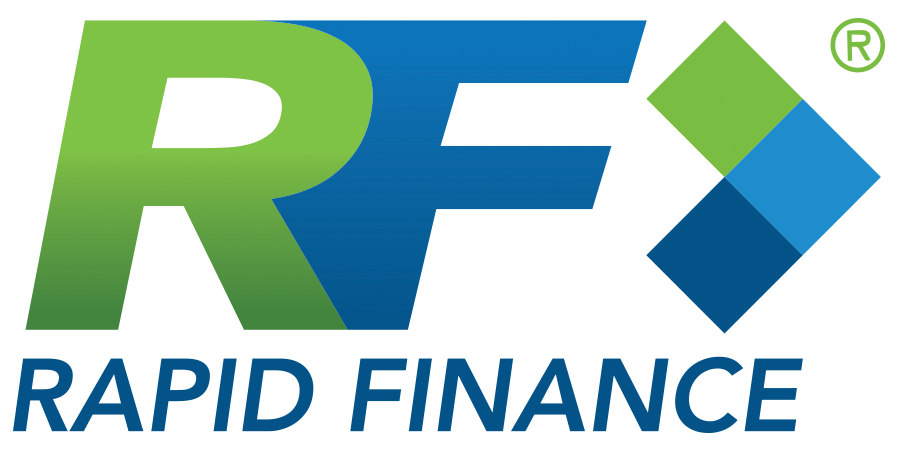Why RapidAdvance Is Now Rapid Finance
February 7, 2019 RapidAdvance has officially changed its name to Rapid Finance.
RapidAdvance has officially changed its name to Rapid Finance.
“The term ‘advance’ is out of favor these days,” said founder and Chairman of Rapid Finance Jeremy Brown. “It also doesn’t reflect who we are as a company or what our brand is. We put our clients in a variety of different financing solutions including factoring, term loans and equipment leasing. ‘Advance’ is very narrow and old school. ‘Finance’ represents where the company has evolved to and where we’re going.”
The company’s logo is also new, but Brown said that they purposely retained the same color scheme to make the change as seamless as possible.
“Before we had an arrow through the word ‘rapid,’” Brown said. “I think the three squares [in the new logo] represent an arrow head so that there’s continuity with the old logo.”
Consistent with the rationale for the company’s name change, Brown said that their business is about 85% term loans and only 15% merchant cash advance, healthcare cash advance and bridge loans. Through partners, Rapid Finance also provides their customers with access to SBA loans, factoring, asset based loans, commercial real estate and lines of credit. By the second quarter of this year, Brown expects that they will offer their own line of credit product.
Rapid Finance is broadly diversified by business type, according to Brown. He said that no business category accounts for more than 25% of their business. As for acquiring new business, Brown said that 60% comes from partners/brokers and 40% comes from their internal direct marketing efforts.
Brown said that Rapid Finance, which employs about 200 people, has hired about 25 over the last six months. Most of the hires were in the technology and sales departments, both internal sales and sales reps who work with ISO partners. He also said they expect to fund between $550 and $600 million this year.
Founded in 2005, the company’s employees are divided between its headquarters in Bethesda, MD and another office in Detroit, MI, which houses Rapid Finance’s direct sales and marketing teams.
Home Improvement Loans on the Rise
February 6, 2019 A story this week in American Banker suggested that popular home improvement TV shows like HGTV’s “Fixer Upper,” “Love It or List It” and “Property Brothers” are creating a growing demand for home renovation, and hence, home renovation loans.
A story this week in American Banker suggested that popular home improvement TV shows like HGTV’s “Fixer Upper,” “Love It or List It” and “Property Brothers” are creating a growing demand for home renovation, and hence, home renovation loans.
Nielsen rating data shows that the combined viewership of the three aforementioned shows on the HGTV (Home and Garden Television) channel rose from 5.4 million viewers in 2014 to 8.6 million viewers in 2018.
deBanked spoke to Michael Funderburk, Director of Personal Loans at LendingTree, which encompasses home improvement loans, and he said that he has seen an increase in home improvement loan volume at LendingTree. But he doesn’t necessarily think there is a correlation to the popularity of the HGTV shows.
Funderburk said people are likely to renovate their home as opposed to buy a new one for a few reasons. One is that new home supply hasn’t quite caught up with demand yet, which is causing home prices to increase. Secondly, mortgage rates are higher than they have been for the last several years.
“Despite the fact that the economy is doing well, people are in better financial positions, have better income, people are thinking ‘What do I do with this [money]? I don’t necessarily [have enough] to move homes, but maybe I can renovate my current home?”
Spending on home remodelling has steadily increased over the last two years from approximately $295 billion at the start of 2017 to nearly $340 billion at the end 2018, according to a study from the Joint Center for Housing Studies of Harvard University.
According to the American Banker story, Doug Duncan, Chief Economist at Fannie Mae, said that there are two reasons why home remodelling spending (and resulting borrowing) is increasing.
“Baby boomers [have] said they intend to age in place,” Duncan said. “As you get older, it requires some accommodations, things like door handles, potential wheelchair ramps, bars in the shower, that type of thing.”
The other reason for increased home improvement, he said, is that Generation X (those born between 1965 and 1979) will also be remodelling their homes.
“Gen Xers maybe have kids in junior high or high school and would like to move up,” Duncan said. “But there simply isn’t inventory, and it’s expensive if they’re in an urban center and in a school district they like.”
Whether it’s because someone saw a beautiful new den built on the “Property Brothers,” or they’re just too settled in to move, the market for the home improvement loans seems to be growing and is likely to continue. And it’s possible that small businesses may seek similar loans to freshen up their stores rather than find a new space.
Meet deBanked’s Pig, and Fund Like One Too
February 5, 2019 Today is the Chinese New Year and the first day of the Year of the Pig, an animal that we at deBanked hold very dear. After all, a piggy bank is featured in our logo! According to the Chinese zodiac, a pig “represents luck, overall good fortune, wealth, honesty, general prosperity” and symbolizes “a hard working, peace-loving and social person with a large sense of humor and understanding.” We couldn’t identify more with these characteristics of the pig! And we hope that our readers enjoy all the good fortune, prosperity and honesty of the pig in the year to come.
Today is the Chinese New Year and the first day of the Year of the Pig, an animal that we at deBanked hold very dear. After all, a piggy bank is featured in our logo! According to the Chinese zodiac, a pig “represents luck, overall good fortune, wealth, honesty, general prosperity” and symbolizes “a hard working, peace-loving and social person with a large sense of humor and understanding.” We couldn’t identify more with these characteristics of the pig! And we hope that our readers enjoy all the good fortune, prosperity and honesty of the pig in the year to come.
We’re so wild about pigs here that, as some of you know, we invited three miniature pigs to visit our office during the holiday season. Not only that, we decided to make a more permanent connection with a very special pig. As of the end of last year, we have sponsored a fully-grown adult pig named Sister Mary Frances. She lives on a farm in Catskill, NY, and while we haven’t met her yet, we already feel a kinship to this pig.
 Sister Mary Frances was named after a nun who worked closely with the farm in Catskill, and according to her caretakers, she is kind and compassionate like her namesake. She is also quite the explorer and enjoys roaming the vast grounds of the farm where she is the only pig. She also enjoys belly rubs, snacking on fruit and sleeping in the sun. And, believe it or not, while Sister Mary Frances has lived most of her life in Catskill, she was actually born in Brooklyn! So she’s got street smarts too.
Sister Mary Frances was named after a nun who worked closely with the farm in Catskill, and according to her caretakers, she is kind and compassionate like her namesake. She is also quite the explorer and enjoys roaming the vast grounds of the farm where she is the only pig. She also enjoys belly rubs, snacking on fruit and sleeping in the sun. And, believe it or not, while Sister Mary Frances has lived most of her life in Catskill, she was actually born in Brooklyn! So she’s got street smarts too.
During the cold months, Sister Mary Frances spends most of her time sleeping in a straw hut. So even her caretakers don’t see much of her. Who knows, maybe she’s busy closing deals. May all of our readers embody the boldness and hardworking nature of the pig and in return be rewarded with prosperity. Happy Chinese New Year and Happy Year of the Pig!
SBA Processes Significant Loan Volume in Days After the Shutdown
February 4, 2019 After the longest partial government shutdown in U.S. history, which shuttered the Small Business Administration (SBA) for more than a month, SBA employees went back to work on Monday, January 28. At the end of the day on January 29, the SBA had processed 1,100 SBA 7(a) loans worth $500 million, according to Bailey Wolff, Public Affairs Specialist for the SBA’s New York District Office. For context, in all of 2018, the SBA processed $25.4 billion in SBA 7(a) loans.
After the longest partial government shutdown in U.S. history, which shuttered the Small Business Administration (SBA) for more than a month, SBA employees went back to work on Monday, January 28. At the end of the day on January 29, the SBA had processed 1,100 SBA 7(a) loans worth $500 million, according to Bailey Wolff, Public Affairs Specialist for the SBA’s New York District Office. For context, in all of 2018, the SBA processed $25.4 billion in SBA 7(a) loans.
“It’s a great number,” Wolff said. “We’re back up and fully operational.”
SBA loan funders and brokers have feared that the backlog of SBA loan applications created by a month-long closure of the government agency would cause extensive delays. But it seems that the SBA is processing these loans quite quickly.
“There is a backlog, but applications seem to be moving smoothly,” said Everett Sands, CEO of Lendistry which funds a sizable amount of SBA loans.
Sands now has seven SBA loan applications waiting to get funded. So far, since the SBA re-opened on January 28, none of his applications have been funded yet. (Normally, it takes 1-2 days for his SBA loans to be approved). But Sands said that last week was essentially catch-up week for the agency. If the volume of loans processed from January 28 through January 29 continues at this pace, delays will be minimal.
“We should be back on track this week,” Sands said.
Fundbox Increases Speed of B2B Transactions
January 29, 2019 Prashant Fuloria, COO, Fundbox
Prashant Fuloria, COO, FundboxAt the end of last week, Fundbox announced that it has launched an AI-enabled platform for B2B companies at the point of transaction, or check out.
“We’re positioning ourselves to be the PayPal for B2B transactions,” a company spokesperson, Tim Donovan, told deBanked. “And that means becoming as ubiquitous as finding Visa, Amex or PayPal in a B2C checkout flow.”
As part of this new e-commerce feature, Fundox can underwrite companies looking to make a purchase in as fast as 45 seconds, Donovan said. And sellers get paid right away. This, of course, is a boon for sellers, who often must wait to get paid. (Fundbox takes on the risk of potentially not getting paid.) For buyers, Fundbox’s terms are generally better compared to using a credit card, Donovan said. As long as the buyer’s credit is approved, they can purchase inventory on an online platform within 3 minutes.
“This [new feature] marks our evolution from a product-centric company to a platform-centric company,” said Prashant Fuloria, COO of Fundbox.
Fundbox offers a number of small business products including small business loans, factoring and lines of credit. Fundbox is partnered with larger companies like Eventbrite, for event organizing, and QuickBooks, for accounting, to help lend to small businesses that use these platforms.
Funding Circle Partners with Stripe
January 23, 2019 Funding Circle announced this morning that it has joined the Stripe Partner Program, which will allow the company to provide financing to Stripe customers in the United States. Funding Circle is a small business loan funder that offers fully amortizing small business term loans. Their loans range from $25,000 to $500,000 and have terms between six months and five years.
Funding Circle announced this morning that it has joined the Stripe Partner Program, which will allow the company to provide financing to Stripe customers in the United States. Funding Circle is a small business loan funder that offers fully amortizing small business term loans. Their loans range from $25,000 to $500,000 and have terms between six months and five years.
“We’re excited to work with Stripe to connect even more business owners with the affordable capital they need to go further,” said Bernardo Martinez, U.S. Managing Director of Funding Circle. “Funding Circle and Stripe are both dedicated to helping companies scale their businesses in the digital age, ultimately creating jobs, opportunities, and driving growth in the broader economy.”
This is Funding Circle’s first integration partnership with a payments platform in the U.S. With the partnership, Funding Circle gets access to Stripe’s small business owners, but Stripe also wins by providing more services to its customers.
“We are enabling Stripe customers to finance their growth and the end result is that, as these companies grow, [Stripe] has a higher number of payments go through their system,” said Martinez.
No money will exchange hands between Funding Circle and Stripe, Martinez said. While this partnership will start with Stripe’s U.S. small business customers, Martinez said that Funding Circle is excited about the opportunity to scale with Stripe, which serves customers internationally.
Funding Circle is not the only small business lender that has partnered with Stripe. Another company called Bitbond, based in Berlin, is listed on the company’s Stripe Partner Program.
Founded 2010, Funding Circle is headquartered in London and has lent $8.6 billion to 62,000 businesses globally. Listed on the London Stock Exchange as FCH, the company employs about 1,000 people and has offices in San Francisco and Denver.
PayPal Credit Commits $25 Million to Help Unpaid Government Workers
January 21, 2019 PayPal announced Friday that it was devoting $25 million to a program that offers interest-free cash advances of up to $500 to federal workers who have been impacted by the record long partial government shutdown.
PayPal announced Friday that it was devoting $25 million to a program that offers interest-free cash advances of up to $500 to federal workers who have been impacted by the record long partial government shutdown.
“No matter where you stand on the issues, the fact is that 800,000 of our fellow Americans suddenly find themselves without a paycheck,” PayPal CEO Dan Schulman wrote in a blog post. “We think that the private sector and the public sector need to come together to think about creative solutions, to be able to help,” he said in a video.
Josh Criscoe, a PayPal spokesperson told deBanked that borrowers need only make the minimum monthly payment, generally equal to 3% of the outstanding balance. The APR is 0% until the cash advance is repaid.
Crisco said that any government worker who has gone without pay due to the shutdown qualifies for a $250 cash advance, while most of the others who meet certain credit criteria, are eligible for the full $500.
“We’ve seen strong interest since Friday and through the weekend,” said Criscoe.
PayPal is using public records to confirm that applicants seeking the interest-free cash advances are, indeed, unpaid government workers. And they are asking for certain forms of verification as well.
PayPal is not the only lending institution that is trying to help unpaid government workers. In California, nearly a dozen credit unions are providing financial assistance to their members affected by the shutdown.
“The uncertainty as to when the shutdown will end has created stress and hardship for many credit union members who are now struggling to pay their bills and provide for their families,” said Elizabeth Dooley, President and CEO of the Educational Employees Credit Union, in a statement.
“Credit Unions are offering options to federal employees affected by the partial shutdown – such as skipping a loan payment or zero percent loans – to help their members get through this challenging time.”
Small Business Funding is Blasting Off
January 18, 2019Despite the pall of the record long partial government shutdown which has hurt brokers and funders of SBA loans, many companies and individuals in the online small business funding space are off to a very fruitful 2019. Below are some that we found.

After 15 years in the screen printing and embroidering business, Edward DeAngelis spent about four years learning the online funding business before creating Amerifi, a small business funding brokerage. Amerifi and DeAngelis, its CEO and founder, have had a very strong 2019 so far. Since January 1, DeAngelis said that Amerifi has facilitated $7,420,667 in funding. This is compared to $1,284,890 for the entire month of January 2018.
DeAngelis attributes this in part to his increasingly diversified product offering. Amerifi, located in Broomall, PA, offers term loans, asset backed loans, lines of credit and merchant cash advances, among other products. He said that he’s trying to develop a brand known for funding every deal, large and small. He also said that developing a solid team, which now includes eight salespeople, is very important.
“I’m not one for high turnover,” DeAngelis said. “I invest in my team. I spend plenty to provide good leads to all my guys and I treat my team well.”
DeAngelis said he provides his whole team with health insurance. Founded in March of 2017, Amerifi has so far brought nearly $49 million of funding to American small businesses.

Co-founder and CEO of Idea Financial, Justin Leto, said they have seen an uptick in volume starting in December of last year and carrying over into 2019.
“In the first week or so of December the volume wasn’t as high as we thought,” Leto said. “But then all of a sudden as we got to the end of the year, even up until New Year’s Eve when we thought there would be nothing going on at all, the volume was tremendous. And it wasn’t volume that we were just declining. It was really good paper coming in. And it has continued through January. The paper has been solid. The quality of the deals are very good.”
Idea financial, based in Miami, FL, provides a line of credit product, with 12 and 18 month repayment periods.
“We have a 650 minimum FICO, so we have to get the higher credit quality merchants,” Leto said. “And they’ve been coming. What I’ve seen is we have an approval for $100,000-$150,000 and it’s rare that anybody takes the full amount…If people are taking a percentage of the line and using it over time and continuing to draw over time for different projects, I think that’s a sign of a responsible borrower…I don’t see a recession coming.”

CEO of Accord Business Funding, Adam Beebe, told deBanked that it was doing about double the amount in funding this month compared to last January. Completely ISO driven, Beebe said that submissions over the past month or so have been up 30 to 40 percent but couldn’t attribute it to any one specific thing.
Founded in 2013, Accord funds MCA deals exclusively and employs over 20 people in its Houston-based office. Last year, it made a key hire to expand its marketing efforts.

“I’ve had more deals in the last two weeks than during any other two week period last year,” said Jarret Ortmann, Senior Lending Officer at Ironwood Finance in Corpus Christi, Texas.
He also said that he’s been seeing more deals coming in from his brokers. Ironwood provides working capital, equipment financing and collateral lending.






























